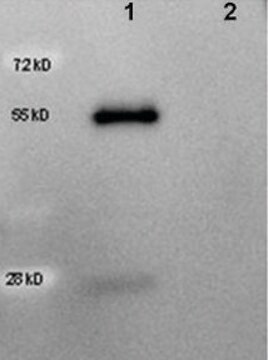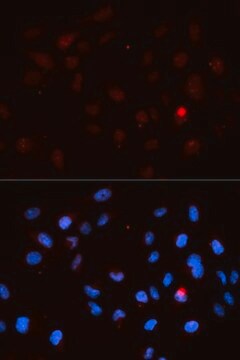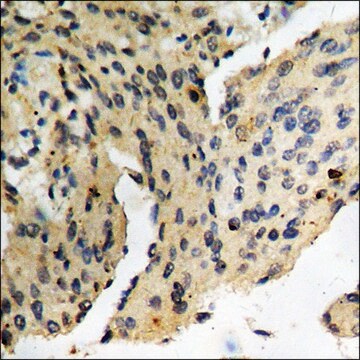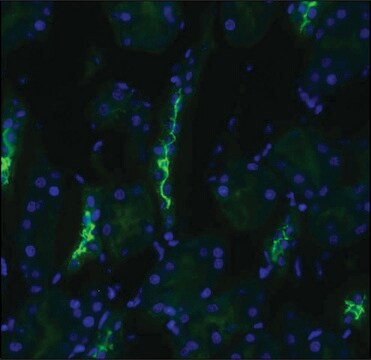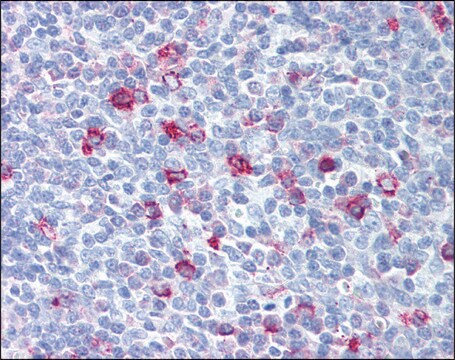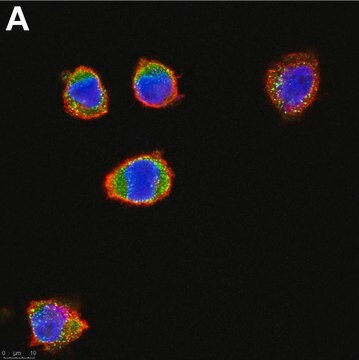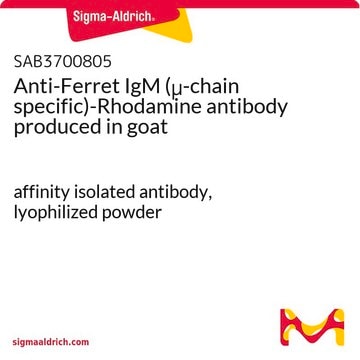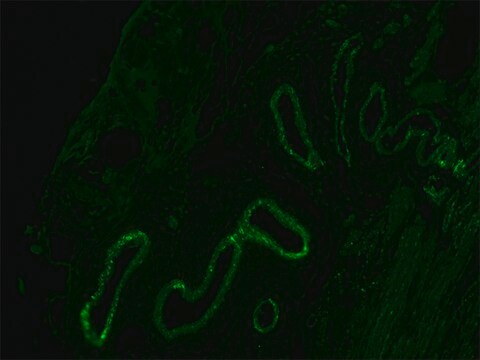SAB3700285
Anti-Goat IgG (H+L), highly cross adsorbed-Peroxidase antibody produced in donkey
affinity isolated antibody, lyophilized powder
Synonym(s):
HRP
Sign Into View Organizational & Contract Pricing
All Photos(1)
About This Item
UNSPSC Code:
12352203
NACRES:
NA.46
Recommended Products
biological source
donkey
Quality Level
conjugate
peroxidase conjugate
antibody form
affinity isolated antibody
antibody product type
secondary antibodies
clone
polyclonal
form
lyophilized powder
species reactivity
goat
technique(s)
immunohistochemistry: suitable
indirect ELISA: suitable
western blot: suitable
shipped in
wet ice
storage temp.
2-8°C
target post-translational modification
unmodified
General description
An immunoglobulin has two heavy chain and two light chain connected by disulfide bond. It mainly helps in immune defense. It is a glycoprotein. IgG is a major class of immunoglobulin. Immunoglobulin G (IgG) participates in hypersensitivity type II and type III. Goat IgG has two subclasses- IgG1 and IgG2.
Specificity
This product was prepared from monospecific antiserum by immunoaffinity chromatography using Goat IgG coupled to agarose beads followed by solid phase adsorption(s) to remove any unwanted reactivities. Assay by immunoelectrophoresis resulted in a single precipitin arc against Anti-Peroxidase, Anti-Donkey Serum, Goat IgG and Goat Serum. No reaction was observed against Chicken, Guinea Pig, Hamster, Horse, Mouse, Rabbit and Rat Serum Proteins
Immunogen
Goat IgG whole molecule
Physical properties
Antibody format: IgG
Physical form
Supplied in 0.02 M Potassium Phosphate, 0.15 M Sodium Chloride, pH 7.2 with 10 mg/mL Bovine Serum Albumin (BSA) - Immunoglobulin and Protease free
Reconstitution
Reconstitute with 1.0 mL deionized water (or equivalent).
Disclaimer
Unless otherwise stated in our catalog or other company documentation accompanying the product(s), our products are intended for research use only and are not to be used for any other purpose, which includes but is not limited to, unauthorized commercial uses, in vitro diagnostic uses, ex vivo or in vivo therapeutic uses or any type of consumption or application to humans or animals.
Not finding the right product?
Try our Product Selector Tool.
Certificates of Analysis (COA)
Search for Certificates of Analysis (COA) by entering the products Lot/Batch Number. Lot and Batch Numbers can be found on a product’s label following the words ‘Lot’ or ‘Batch’.
Already Own This Product?
Find documentation for the products that you have recently purchased in the Document Library.
Specific IgG for cat allergens in patients with allergic conjunctivitis
Miyama A, et al.
International Ophthalmology (2015)
Anna Georges et al.
Scientific reports, 9(1), 2724-2724 (2019-02-26)
The ubiquitin specific protease 7 (USP7 or HAUSP) is known to regulate a variety of cellular processes by binding and deubiquitylating specific target proteins. To gain a more comprehensive understanding of its interactions and functions, we used affinity purification coupled
Brooke C Wilson et al.
Nature communications, 11(1), 5469-5469 (2020-10-31)
Zbtb11 is a conserved transcription factor mutated in families with hereditary intellectual disability. Its precise molecular and cellular functions are currently unknown, precluding our understanding of the aetiology of this disease. Using a combination of functional genomics, genetic and biochemical
Ashley M Campbell et al.
PLoS pathogens, 18(1), e1010235-e1010235 (2022-01-11)
The Epstein-Barr virus (EBV) BGLF2 protein is a tegument protein with multiple effects on the cellular environment, including induction of SUMOylation of cellular proteins. Using affinity-purification coupled to mass-spectrometry, we identified the miRNA-Induced Silencing Complex (RISC), essential for miRNA function
Carlos F De La Cruz-Herrera et al.
PLoS pathogens, 19(7), e1011477-e1011477 (2023-07-06)
SUMO modifications regulate the function of many proteins and are important in controlling herpesvirus infections. We performed a site-specific proteomic analysis of SUMO1- and SUMO2-modified proteins in Epstein-Barr virus (EBV) latent and lytic infection to identify proteins that change in
Our team of scientists has experience in all areas of research including Life Science, Material Science, Chemical Synthesis, Chromatography, Analytical and many others.
Contact Technical Service